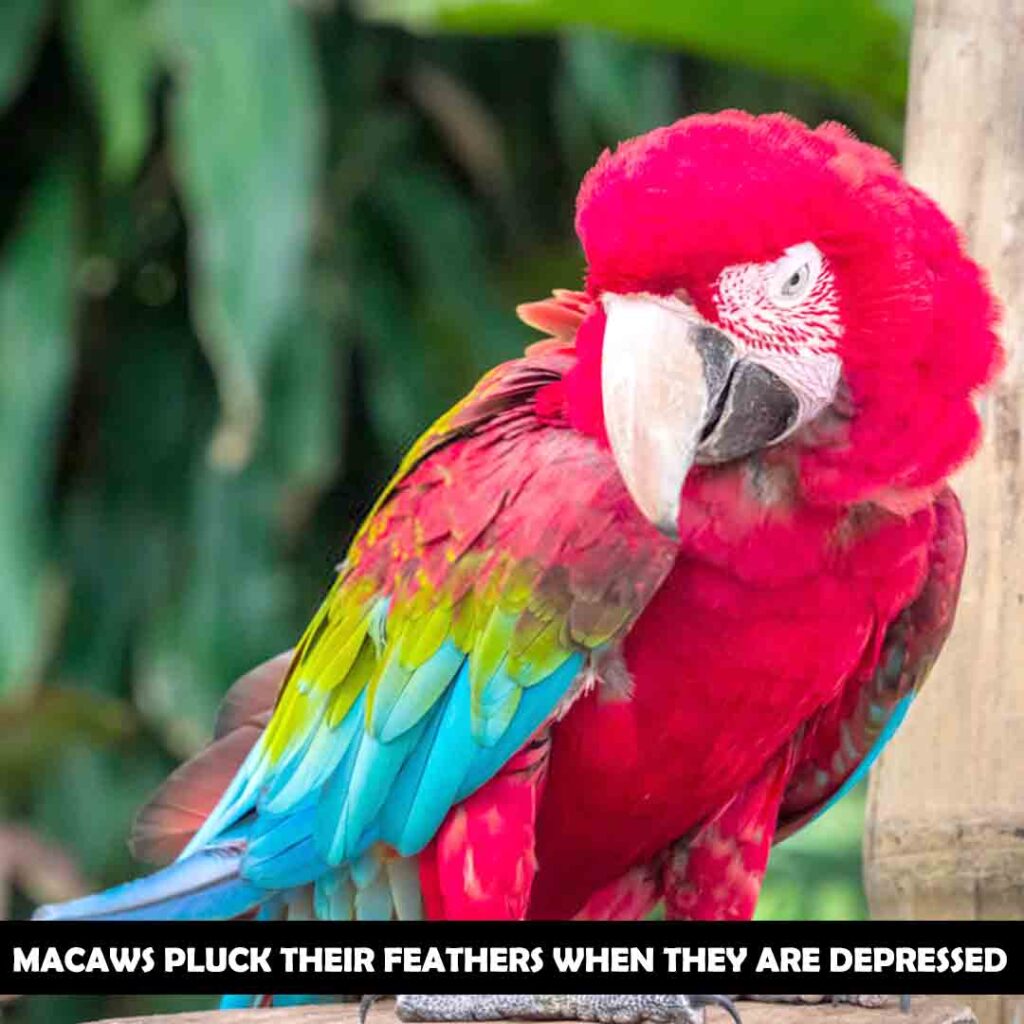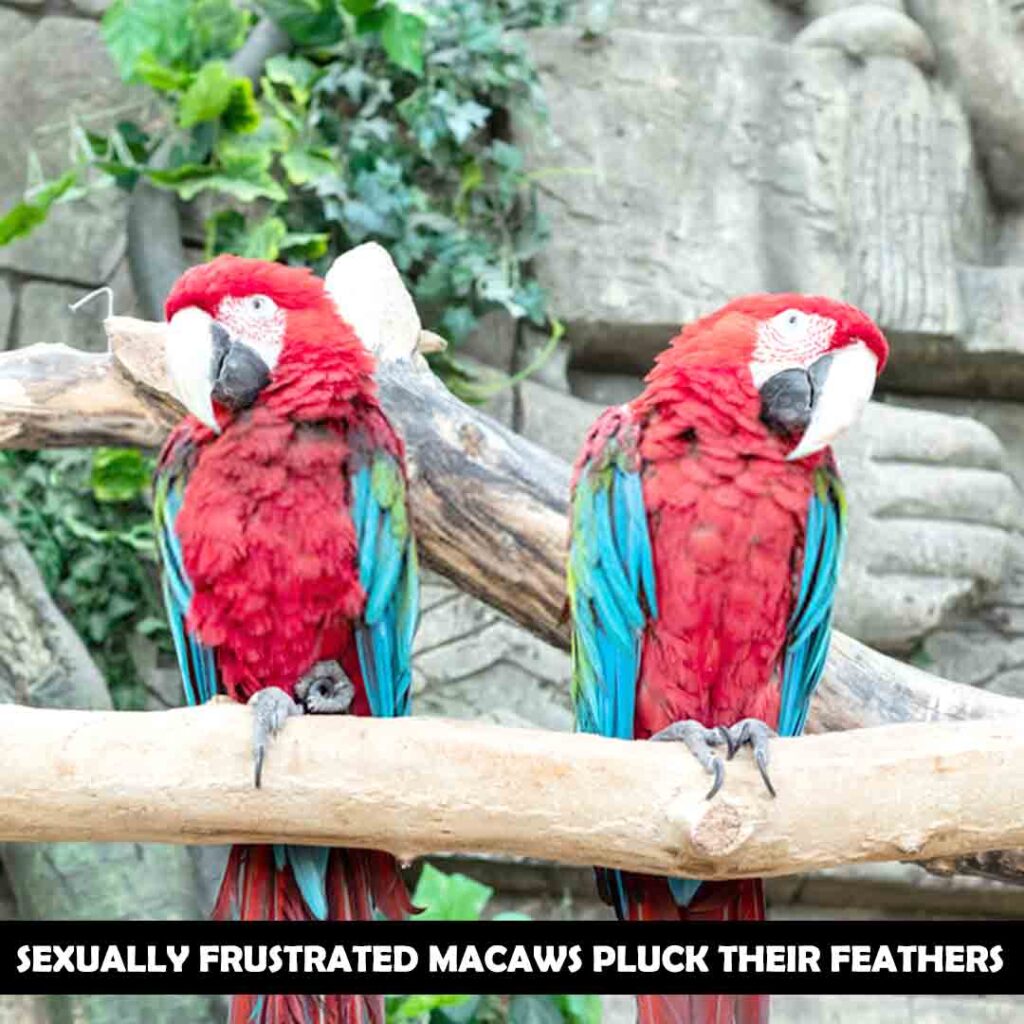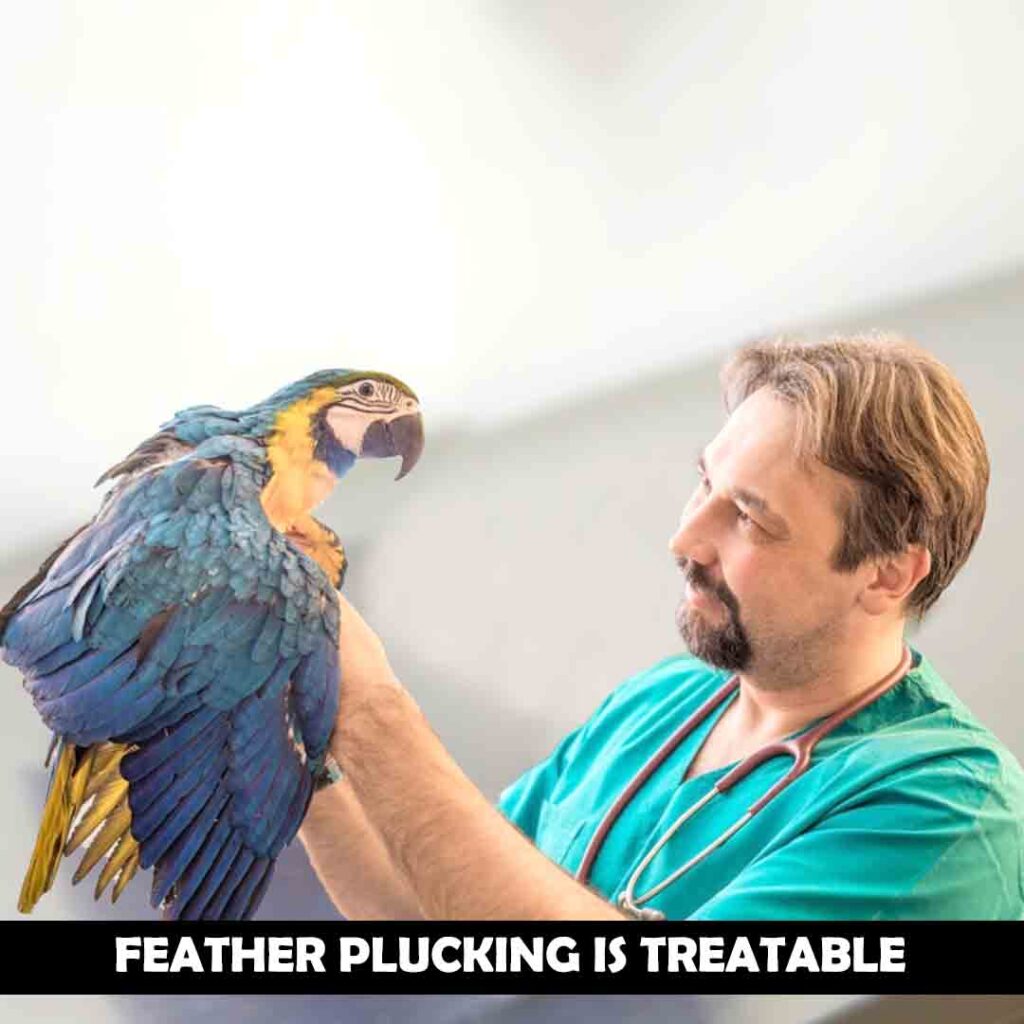Last Updated on February 8, 2022
Sometimes your macaw becomes lazy, and despite receiving good care, they pluck their feathers. Are you worried about your macaw’s destructive behavior? In this article, you will get the answers to your questions like: Why do they pluck their feathers? What should you do to stop them from this abnormal behavior?
Macaws pluck their feathers due to any disease, boredom, depression, stress, lack of attention, sexual frustration, malnutrition, and lack of exercise. Good space to play and breed, adequate time, the appropriate concentration, and a balanced diet can stop the habit of feather plucking in macaws.
Here’s everything you need to know about improving your macaw’s life. You still need to know all medical and psychological issues related to the destructive behavior of feather plucking. In this article, we will discuss the ways to improve their health issues and minimize losses.
First of all, you should know about the problem. Is it a regular activity?
Is feather picking an everyday activity for all macaws?
Macaws are colorful because of the vibrant colors of their feathers. Sometimes, with changes in environment and emotions, they start plucking their feathers. It is a habit that is very common. Once developed, it is not possible to stop completely. In severe cases, feathers are entirely damaged and may not grow again. So, many reasons are associated with feather plucking in macaws.
Why do macaws pluck their feathers?
The causes of feather plucking are given below.
Malnutrition
Like other birds and humans, parrots also need a nutritious diet for healthy growth. A nutritional food contains minerals, vitamins, and other essential nutrients suitable for macaws’ health. Deficiency of any nutrients may lead to physical disorder. Each nutrient is responsible for its specific function. Deficiencies in calcium, potassium, magnesium, selenium, and manganese can also be associated with an itchy skin problem in macaws. Itching of the skin irritates, and macaws start plucking their feathers.
Depression or stress
When macaws are under stress they pluck their feathers to pacify them. This is not similar in all macaws but varies according to the situation and species. Macaws undergo stress because of the following reasons;
- Introduction to a new place
- New owner and surroundings
- Cage place is not suitable
- Other pets in the home
- Loud sound

Boredom
Often you see your macaw is busy playing with toys, a very satisfying activity to macaws. After some time, they get bored of playing with the same kind of toys daily. They feel happy to fly freely in their natural environment, chew twigs and leaves, and go out foraging which keeps them active and interactive.
Lack of the above facilities gets them bored, thereby inducing the habit of feather plucking that is an environmental issue and can be solved. Macaws are routine-oriented birds; change in their routine also cause boredom.
Lack of care and attention
Macaws like to play with their owner and feel happy to spend time with them. If the owner is away or does not give proper time, macaws feel lonely. Sometimes, get aggressive and start picking their feathers. They usually do this to seek attention from their owner.
They make bonds with their owners and are known as good companions. They become used to their owners, place, surroundings, nearby sounds, and their routines of playing and feeding. Any disruption might cause aggressiveness that leads to feather plucking in some macaws.
Injury or diseases
In macaws plucking, behavior may arise due to injuries resulting from skin allergies, parasitic attacks, and other infectious diseases. Lack of proper treatment enhances the plucking behavior, which becomes impossible to recover in the worst conditions.
Inflammation of skin in macaws may result from the infection caused by bacteria and fungi. Newborn and young parrots are susceptible to these infections, and only a professional veterinarian can identify the actual cause of skin disorder that leads to feather plucking.
Sexual frustration
Socialization is an essential requirement both in the wild and in captivity. In the wild, macaws generally live in flocks and have the opportunity to mate whenever they want. Many species make pair bonds. During the breeding season, they mate and remain bonded for years or even their entire lives. The pairs live in bonds even during the non-breeding season and continue nesting, preening, foraging, and vocalizing constantly.

On the other hand, in captivity, most macaws are not able to interact with each other. Many pet parrots are housed singly in cages having no opportunity to socialize with flock mates nor the chance to hunt for nest sites, food, or other activities. In these circumstances, when breeding seasons arrive, they often become sexually frustrated and cause feather destruction.
How to stop feather plucking in macaws?
Feather plucking is a common disorder that can be minimized by proper husbandry. First, you have to rule out the reasons for which your macaw is destroying their feathers. Better management and care can stop feather plucking in macaws.
- Consulting a veterinarian
- Examining your bird entirely for any injury or physical signs
- Reducing stress in your macaw
- Reducing boredom in your macaw
- Giving proper attention and care
- Providing a balanced diet and adequate housing
- Safely handling the sexually frustrated macaw.
How to overcome boredom in your macaws?
Macaws are very attentive and playful birds. They remain active and healthy by keeping themselves busy playing with toys. Lack of care and enjoyment facilities may develop boredom in your macaw. Some of the tips to overcome boredom are given below;
- Provide your parrot with plenty of toys.
- Increase cage size and provide enough space to play.
- Rotate them often and often. The rotation of toys keeps them busy.
- Playing with wooden toys fulfills their need for chewing.
- Hide their feed in a foraging toy to help them enhance their problem-solving ability.
- Spend sufficient time with your macaw.
How to control feather plucking in macaws caused by injuries and diseases?
If your macaw is plucking its feathers, the first step is to rule out the reason. Examine your macaw carefully if it is suffering from skin inflammation or some disease. In this respect, consult a veterinarian to treat and improve the health of macaws by eliminating the causes of skin injuries through proper treatment.

How to control feather picking by proper diet and nutrition?
A proper daily diet is necessary for maintaining the good health of macaws. They like fresh fruits, vegetables, nuts, seeds, and leaves of some plants. A macaw should eat a nutritious diet as follows to reduce the chances of picking feathers.
- Fresh fruits should be given. They are full of nutrients and increase the immunity level of macaws.
- Vegetables and some legumes should be added.
- Pellets should be added to their diet for additional supplements.
- As they are routine-oriented so follow the same routine daily.
How to minimize sexual frustration?
With the arrival of spring which is the breeding season of macaws, many species become aggressive because of sexual desire. They want to mate but could not find their mate because they are alone, or in a separate cage. There is not a single reason but sexual frustration leads to feather plucking. It can be minimized by;
- Reduce sexual stimulus by taking a mirror out of the cage
- Consult a vet for hormonal therapy.
- Involve your macaw in playing with toys
- Give them treats.
Conclusion
So, it is obvious that your macaw is plucking its feathers due to an improper amount of essential nutrients, skin inflammations, a non-suitable place of the cage, stress imposed by a new place, owner or pet birds, sexual frustration, and lack of attention. Providing good housing and nutrition, spending time with your macaw, and consulting a vet can stop feather-biting in macaws.
Also Read About: How To Treat Macaw Bite and Stop them from Biting?
Bilal is an aviculturist who loves to write in free time. His personal experience with bird care and breeding enables him to share valuable tips. So far, he has contributed more than 100 blogs to this site.
His goal is to promote bird-keeping and save endangered species.
